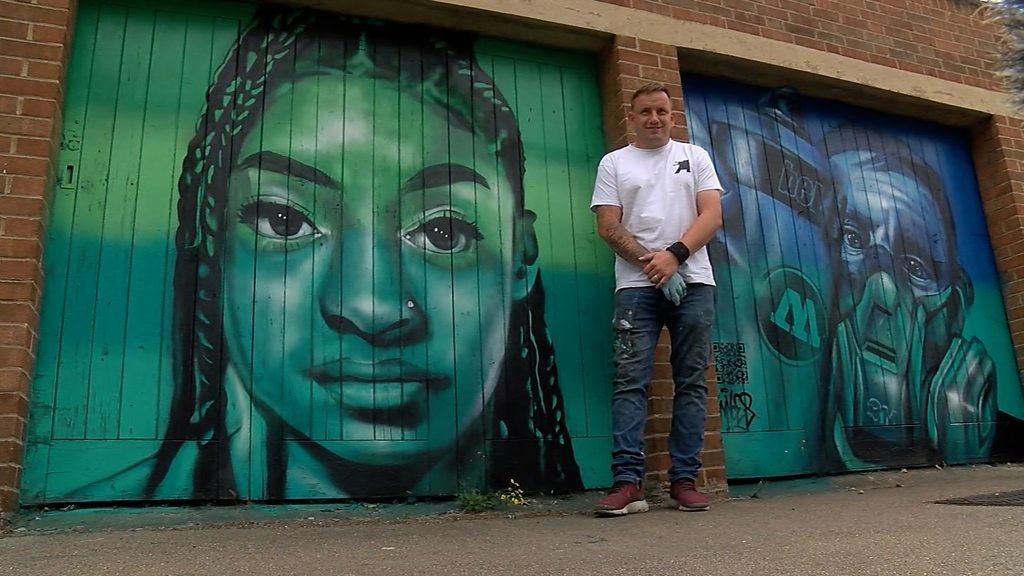Norwich's 12th Man: 'My barber saved my life and could help others'
- Published
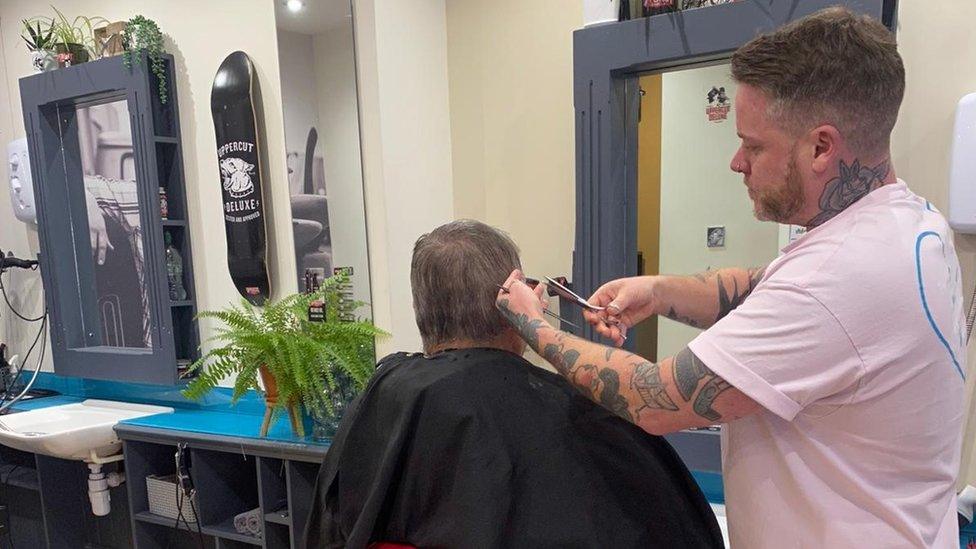
Kyle, who wanted to remain anonymous, reached out for support at Croppers after hearing about 12th Man
When Kyle walked into a barber shop, he was at the "end of his tether" and struggling with his physical and mental health.
He was there because he had heard about the 12th Man - a Norwich-based campaign that uses a football analogy to empower men to talk about mental health more openly - and his barber had signed up to the cause.
"I just burst into tears," says Kyle, reflecting back on when he first spoke there four years ago.
"I was going through the mill and they just asked what was wrong and said, 'Let's talk about it.'
"They listen and they don't judge and it somehow feels more comfortable to have a conversation with someone there."

Nick Little, left, and Tim Guy, who run the 12th Man, are creating an army of people to help men with their mental health
Through grant funding, 12th Man provides free mental health first aid training to businesses and groups used by men, in a bid to open up conversations and provide interventions.
Places like tattoo parlours, pubs and gyms are among the everyday settings that have signed up.
Also involved is Croppers barbers in Norwich, which is helping people like Kyle.
"If I hadn't spoken to them, there's a possibility I may not still be here - but I did speak to them and I'm still here," says Kyle.
The 43-year-old, who lives in the city, has been a regular customer ever since, with monthly haircuts.
"They have been the light in the darkness to guide you home. They have saved my life and could save other people's lives."
Steve Bunn, who runs Croppers in St Gregorys Alley with business partner Mike Nicholson, was one of the first people to get on board with the 12th Man campaign.
The project was set up in 2013 by Nick Little and Oz Osborne, who died four years ago after a short illness, to get men talking about mental health, as "the outcomes for men are pretty dire and so we need to turn that around".
Government statistics, external show suicide in England and Wales is three times more common among men than among women, and is the biggest killer of men aged under 50.
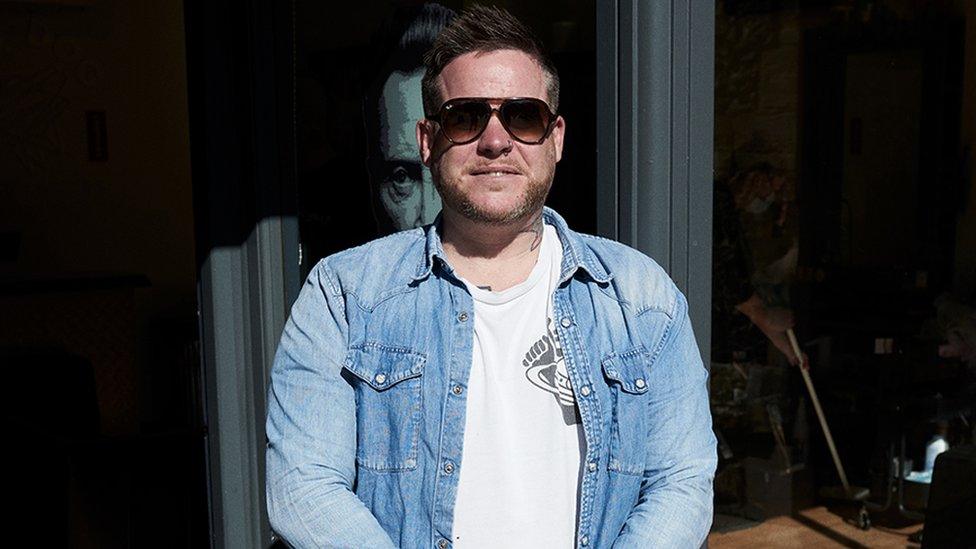
Barber Steve Bunn says it was "humbling" to have been able to come to the aid of Kyle
The idea behind the 12th Man is to get men to "see mental health like they see their football team", says Mr Little.
"You never give up on your team, so do the same for your friends, family, colleagues," the 41-year-old from Brundall, Norfolk, adds.
Mr Bunn was one of the first to undertake the Mental Health First Aid England (MHFA), external training delivered for free by the 12th Man in 2016.
Since then, it has trained 430 people.
Mr Bunn says it is "humbling" to have been able to have helped Kyle.
"It took a lot of courage on his part to come in here and ask if anyone was around for a chat, and we made time for him.
"He was open with us to allow us to empathise with his situation," he says.
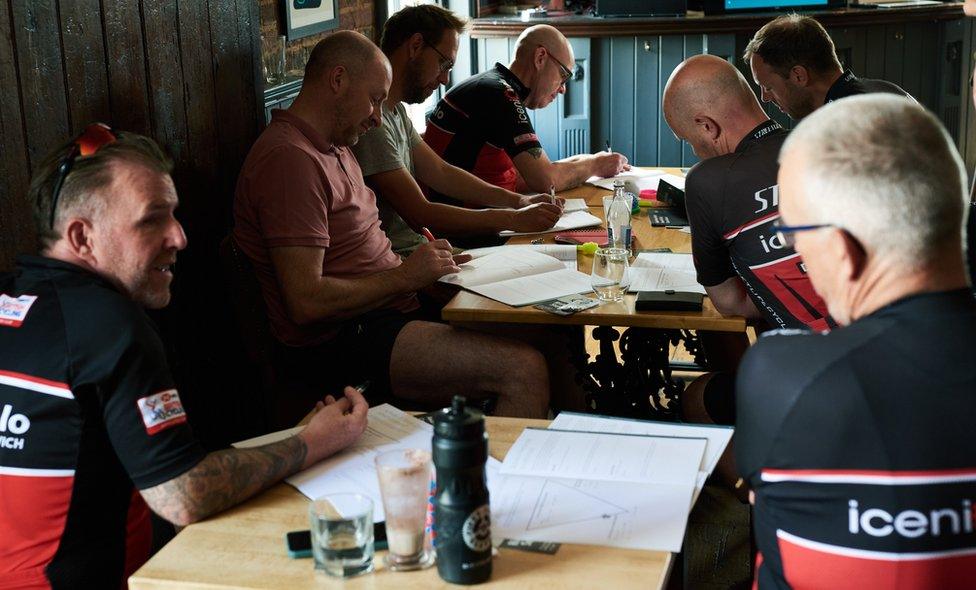
The 12th Man campaign, which started in Norwich and is expanding across Suffolk and Essex, has also trained cyclists to be mental health first aid aware
Mr Bunn says the training helps him and his staff to not shy away from such conversations.
"There could be that social awkwardness and if someone started to talk about something sensitive, it's easy to clam up and assume you are going to say the wrong thing.
"What it does is it disarms you of those feelings, you can talk to someone and not be an expert, but give that person the space to talk and show them you are listening," he says.
"It's made us much better listeners."
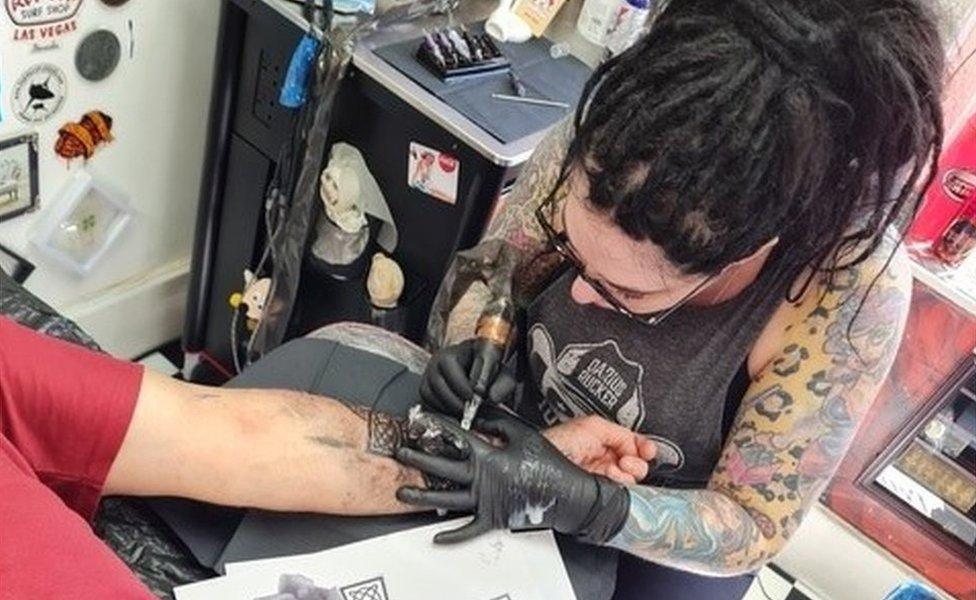
Tattoo artists, including Red's Tattoo Parlour in Colchester, have also got on board
Mr Bunn says although being a mental health first aider is no replacement for professional help, it enables him and his team to "normalise" conversations about mental health in an environment where men feel comfortable.
"You can come into a barbers and still be you and talk about mental health and how you feel, but that doesn't have to dominate the conversation," he says.
"Over the years, people may have talked and opened up and been aware of the 12th Man without mentioning it, which is what you want - the end goal is for everyone to be able to talk about their wellbeing, physically and mentally, as openly as they need to."
Allow Instagram content?
This article contains content provided by Instagram. We ask for your permission before anything is loaded, as they may be using cookies and other technologies. You may want to read Meta’s Instagram cookie policy, external and privacy policy, external before accepting. To view this content choose ‘accept and continue’.
The 12th Man is expanding to Suffolk, Essex and further afield, and reaching out to more groups.
"By working with businesses such as barbers, tattoo shops, pubs and gyms, and interest groups like cycling clubs and football clubs, we want to train an army of people who work in places where men go, or go where men go, in large numbers.
"We see these places as the front line of men's mental health, so we need the army there, so to speak.
"Millions of conversations happen in these places each year and they are all opportunities for interventions," says Mr Little, whose co-founder died from a short illness in 2018.
The campaign has received commissions and grants from Norfolk and Suffolk community foundations, Norfolk and Suffolk county councils, Cheshire East Council and Colchester Catalyst to provide the training.
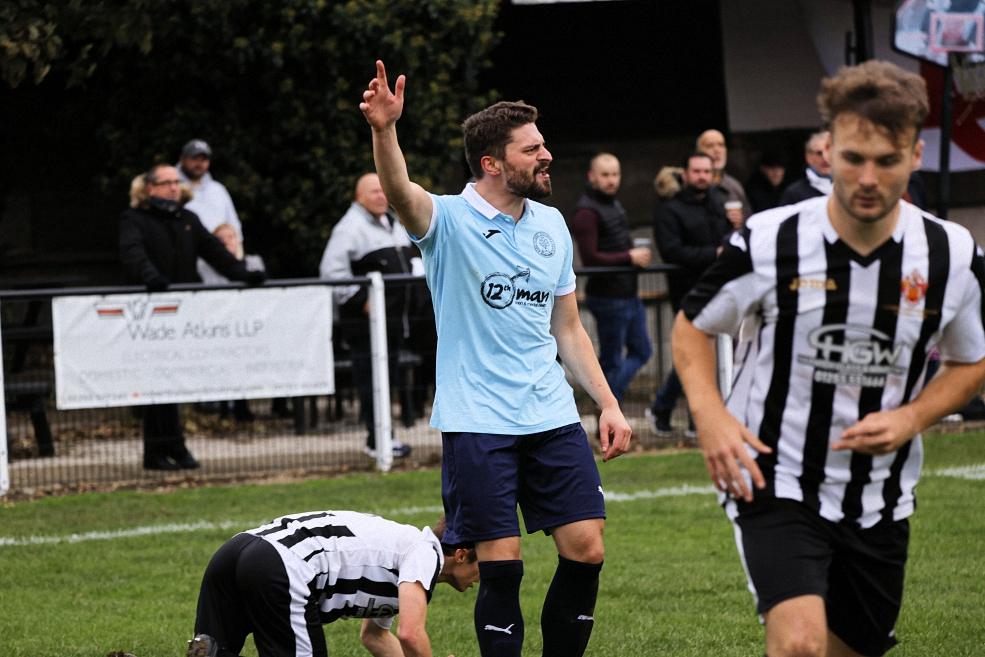
The idea behind the 12th Man is to get men to "see mental health like they see their football team"
Simon Blake, chief executive of MHFA England, says initiatives such as 12th Man are "vital in helping to break down traditional ideas about masculinity and the stigma associated with mental ill health".
"I am thrilled that 12th Man have delivered our training to over 400 people. With their help we have now trained one in 50 adults in England in mental health skills and knowledge," he says.
Suzanne Meredith, deputy director of Norfolk Public Health, adds: "The work done by 12th Man in Norwich is incredibly valuable; by providing training to businesses, interest groups and others in how to support those dealing with challenges to their mental health.
"They're getting the skills and knowledge needed to help people at their lowest, raising awareness of the importance of talking to someone and [saying] that you are not alone during difficult times, such as a relationship breakdown or financial difficulty.
"It is also important to remember that there are steps each of us can take to make sure we're looking after our own mental wellbeing.
"These can be as simple as trying something new with the family, taking children for a walk perhaps on one of Norfolk's trails, helping others or talking with a friend."
If you need support, help is available via BBC Action Line

Find BBC News: East of England on Facebook, external, Instagram, external and Twitter, external. If you have a story suggestion email eastofenglandnews@bbc.co.uk
Related topics
- Published27 July 2022
